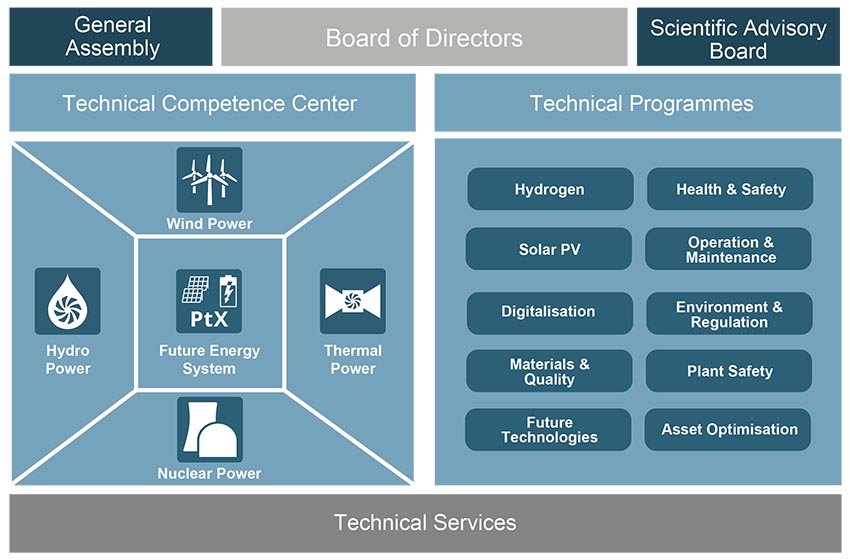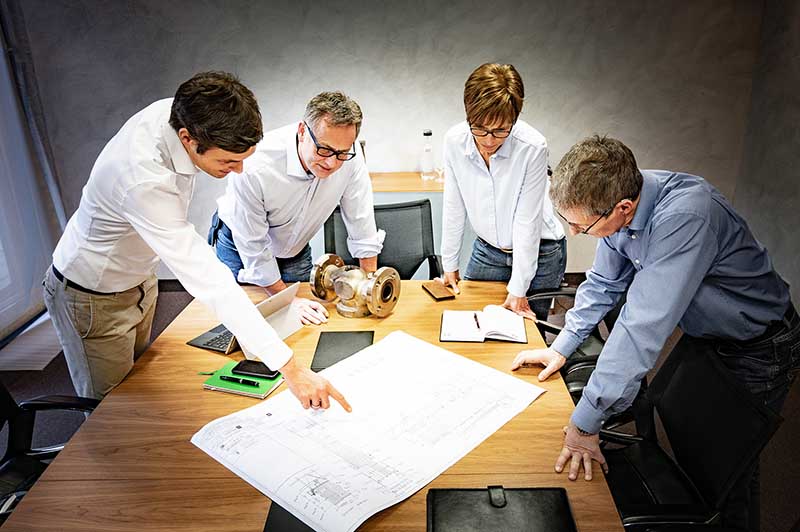vgbe energy is the international technical association of energy plant operators. Their ordinary members operate power, heat and cooling plants, store energy, produce H2 and other green gases and are active in sector coupling. Membership is open for companies and institutions of the entire power business.
Currently the company counts 411 members in 29 countries in Europe and overseas with an installed capacity of 292,000 MW.
vgbe energy is committed to developing economy and society in a climate-neutral and sustainable way by demonstrating technical options required for environmentally friendly, safe and economical energy supply.
Interview with Dr. Oliver Then, Executive Managing Director of vgbe energy e.V.
Easy Engineering: What are the main areas of activity of your association?
Oliver Then: vgbe is an independent competence centre which supports its members at home and abroad in their respective business activities and in the implementation of innovations and strategic tasks to jointly realise the energy transition with all political and social groups involved. Maximum efficiency at minimum environmental impact, maximum occupational safety and maximum plant availability, i.e., security of supply, are issues of top priority on our agenda.
We are also the “voice of plant operators”: we provide fact-based input, thus enabling technology-open and objective debate on technology issues to identify the optimum technical solution in order to realise the energy transition towards CO2 neutrality. We cooperate with all partners along the energy value chain, especially with manufacturers and service providers to improve energy conversion processes as mentioned above.
We pursue various activities to achieve these tasks. One of our core activities is the exchange of experience in our committees and working groups. This is the original idea of vgbe, which was founded in 1920 after a severe boiler explosion in a West-German power plant. Although we are looking back on a long history, the basic idea of exchanging experience and learning from the “top of the class” is still as fresh and unrivalled as more than 100 years ago and impressively demonstrated by our successes and the benefits our members have been enjoying through joint community work.

Our committees and groups deal with all energy conversion technologies and their related aspects from conventional, to renewable up to nuclear generation. These activities are at the centre of the association’s work and numerous additional activities and services are derived from the work of these groups, like the elaboration of our internationally acknowledged vgbe Standards, e.g., our worldwide used power plant designations systems KKS and RDS-PP®, research projects, conferences on all aspects of power generation which are organised by our associated business enterprise vgbe energy service GmbH and a lot of further activities such as databases, benchmarking etc.
E.E: What’s the news about new activities?
O.T: Although we have always been deeply committed to the core issue of vgbe, namely the exchange of experience, vgbe has constantly been adopting to the different requirements of its members and needs of the energy industry. After our successful rebranding and renaming, we have realigned our strategy and completed fundamental structural and operational changes, i.e., the main activities of the association are now grouped into two areas:
Firstly, our five Technical Competence Centres – Hydro Power, Wind Power, Future Energy System, Thermal Power and Nuclear Power –, in which the classic working committees and activities and services assigned to them are organised. Secondly, our “Technical Programmes” which I would like to consider as new “product”. Thes programmes cover or develop overarching or completely new topics. These form the basis for the exchange of experience and cooperation, both between members and with other interest groups in the sector. Technical Programmes provide more flexible implementation conditions in terms of participation, funding and structuring compared to the contributory committee approach in the vgbe Technical Competence Centres. It has become apparent that there is a great deal of interest in the separately funded, project-oriented work. Moreover, it was perceived as a great enrichment in the vgbe community that now also non-vgbe members can participate in goal-oriented project work.
These two areas are complemented by our technical services, namely the vgbe materials and oil laboratory, supervision of construction and assembly, chemical investigations (water chemistry) and special engineering services which are mainly provided by vgbe energy service GmbH.

E.E: At what stage is the market where you are currently active? What can you tell us about market trends?
O.T: As already outlined, vgbe is looking back on a long history and tradition but has always met the requirements of the energy industry and its members. Since February 2022, when Russia started its war of aggression on Ukraine, it has become ever so apparent that independent and affordable security of supply with minimum environmental impact are at the centre of the energy transition. Together with our member community we have been focusing even more on this issue and are actively and vigorously pursuing this objective which requires fast expansion of renewables and rapid market ramp-up of possibly green hydrogen. Before these targets are achieved, we also need to operate our conventional fleet flexibly to make up for fluctuating generation of renewables.
During the last months we have initiated a lot of activities in this direction, e.g., with our Position Paper on “H2-Ready” where we defined with clear technical focus from the operator perspective what is meant by “H2-ready” because in the case of complete decarbonisation, hydrogen and hydrogen derivatives will remain the “only fuel” alongside biomass, biogas and waste here in Germany in order to ensure security of supply and grid stability. Our Position Paper “H2-Ready” was further complemented by our “Fact Sheet for Gas Turbine Plants” which provides additional information on the energetic use of hydrogen in gas turbine plants. This includes the technical, economic, and regulatory challenges that operators have identified when using hydrogen in existing and new gas turbine plants.
As regards the flexible operation of the conventional fleet, we have been supporting our members, which readily met political requirements last spring and summer and brought back mothballed coal-fired capacity back to the market. Here vgbe provides support concerning procurement, maintenance and personnel.

E.E: What estimations do you have for 2023?
O.T: vgbe and its member companies consider the rapid transition of the energy supply system the most important task in the near future. Operators are ready to accept the challenge for the benefit of society, economy and climate. Now it is up to politics to create the necessary conditions to reliably pave the way for the extension of renewables which are to cover 80% of electricity supply by 2030. Besides, we all know that the demand in electricity will sharply increase because electricity will become the central source of energy for heat generation, mobility and the production of hydrogen. As in the past 103 years, vgbe will make its contribution to support its members and the entire energy industry to achieve this overarching goal with our entire expertise and the vast amount of our services following our claim “energy is us”.

